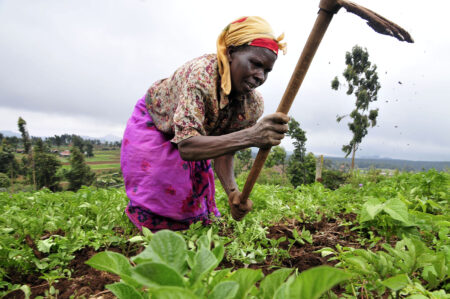Global leaders have called for African governments to collaborate with the private sector in order to save the economy post Covid-19 pandemic.
Speaking during the United Bank for Africa’s Africa Day 2020, the leaders emphasised the need for meaningful collaboration between governments and the private sector, as a requirement for the quick recovery of the economy of the African continent post Covid-19.
UBA Group Chairman Tony Elumelu collaboration will be effective in flattening the curve.
Elumelu spoke on the need to mobilise quickly and explained the necessity to identify a more fundamental solution to Africa’s challenges.
“This is the time for us to deal with the situation, this is not the time for finger pointing, but for collaborative efforts by governments and organisations, to fight the pandemic globally. There is need to flatten the curve, we need global co-operation to stem global depression. Africa requires a large stimulus package, and we need long-term solutions to prevent a cycle of debt,” Elumelu noted.
on his part, Liberian President, George Weah, demonstrated how collaboration has assisted his country to stem the sufferings brought about by the coronavirus pandemic.
“In Liberia we have taken measures to ease the financial burden on vulnerable business in the informal sector by providing small loan assistance to SMEs and traders. In addition, we are working with commercial banks to manage the repayment of loans as well as to create stimulus packages for citizens,” President Weah said.
The President and Chairman of the Board of Directors of the African Export–Import Bank (AFREXIMBANK), Professor Benedict Okey Oramah also weighed in on the matter, calling for the swift implementation of the African Continental Free Trade Area (AfCFTA) agreement and disclosed that Afrexim has made available $200million to supply fertilisers and grains amongst across Africa.
The Afrexim boss asserted “If Africa allows hunger takeover the people, it will see an increase in insecurity, which will take a long time to overcome.”
George Chikoti of African Caribbean and Pacific Group of States (ACP), said that the huge task of economic recovery on the continent, rests on both the government and the private sector.
“African governments need to accept the support of the Private Sector in alleviating the impact of the COVID-19 pandemic in Africa. We have so far been able to release $25m to all member states”, Chikoti added.
Achim Steiner of the UNDP focused on digital connectivity as an enabler of development. “What we need to look at is to find a way for government as a regulator and also as an investor, to leverage private sector investment into these areas” Steiner said.
Peter Maurer, President, ICRC, said there is the need to look at pandemics as part of a broader health system which needs stabilisation. “We must do more than life-saving. This pandemic has illustrated the weakness of health, water, sanitation and social systems, and we have to heavily invest into the stabilisation of these systems,” he said.
This was the 2nd UBA Africa Day Conversations, screened live across the continent.
UBA helps set the debate around African economic development through its series of “Africa Conversations”.
This year, the focus was on the Sustainable Development Goals (SDGs) and the Covid-19 pandemic.
The panel included the President of Liberia, H.E George Weah; United States Senator Chris Coons; the President & Chairman of the Board of Directors of the African Export-Import Bank (AFREXIMBANK), Professor Benedict Okey Oramah; President, International Committee of the Red Cross (ICRC), Peter Maurer; and was moderated by the Group Chairman, UBA Plc, Tony O. Elumelu.
Other leading voices contributing were the Founder, Africa CEO Forum, Amir Ben Yahmed; the Secretary-General of the African Caribbean and Pacific Group of States (ACP), H.E George Chikoti; Administrator, United Nations Development Program (UNDP), Achim Steiner and Donald Kaberuka, the former President of the African Union.
The COVID-19 pandemic has hit almost all African countries and appears poised to worsen dramatically.
The disruption of the world economy through global value chains, the abrupt falls in commodity prices and fiscal revenues and the enforcement of travel and social restrictions in many African countries are the main causes of the negative growth.
African Union report projects that exports and imports of African countries are projected to drop by at least 35 percent from the level reached in 2019. Thus, the loss in value is estimated at around 270 billion US dollars.
Also Read: Covid-19 pushes Kenya’s luxurious hotel out of business











